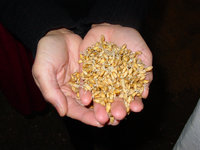Malt
|
|
- MALT also means mucosal-associated lymphoid tissue.
Malting is a process applied to cereal grains, in which the grains are made to germinate and then quickly dried before the plant develops.
The term malt refers to several products of the process:
- The grains to which this process has been applied, for example malted barley,
- The sugar derived from such grains and heavy in maltose, such as baker's malt,
- A product, based on malted milk, similar to a malted milkshake.
- whisky or beer can also be called malt as in Housman's aphorism "malt does more than Milton can, to justify God's ways to Man."
Malting grains develops the enzymes that are required to modify the grain's starches into sugars. Barley is the most common malt because of its high enzyme content. Other grains may be malted, although the resulting malt may not have sufficient enzymatic content to convert its own starch content fully and efficiently.
The typical "pale malt" malting process is as follows:
- The fresh raw grains are washed and soaked for a period of time to begin germination
- A constant moisture is held to promote germination and growth of the acrospire
- The acrospire is allowed to grow to a length equal to the grain, or a little less (about 4-6 days for barley)
- The "green malt" is then kilned at 100°F to 120°F (38°C to 49°C) for about 24 hours and then at 140°F to 160°F (60°C to 71°C), until the moisture content is less than 6%.
Darker brewing malts are sometimes kilned in different ways to promote different characteristics.
Malt is used to make beer, whisky, and malt vinegar.
Reference
- Make Your Own Malt (http://byo.com/feature/284.html), Brew Your Own magazine (ISSN 1081826X), August 1997, pp. 32-36.da:Malt

